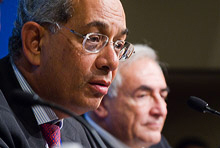
Typical street scene in Santa Ana, El Salvador. (Photo: iStock)
IMF Survey: Emerging Markets Worry When Advanced Countries Falter
October 16, 2008
- IMF must innovate to help emerging economies with financial problems
- IMF help for developed countries' financial markets still to be decided
- Emerging countries play bigger role world economy, need to be heard
Youssef Boutros-Ghali is the first official from an emerging market country to head the panel that sets the IMF's overall policy priorities.

Boutros-Ghali (l) with IMF head Dominique Strauss-Kahn: Finance has become global, yet supervision, surveillance, regulation are still local (IMF photo)
YOUSSEF BOUTROS-GHALI
He spoke with IMF Survey online's Camilla Andersen about his election as Chairman of the International Monetary and Financial Committee (IMFC) and the possible boost his new position may lend to the voice of developing and emerging market countries.
IMF Survey online: Many people think that the current financial crisis is the worst since the Great Depression. What does it look like from the perspective of an emerging market country such as Egypt?
Boutros-Ghali: It generates very serious anxiety, not only for the traditional reasons of having your trading partner—your financial partner—in trouble, but for putting a new reality on the scene—namely that these are problems generated by industrial countries from which industrial countries suffer. And that is new.
Problems of that magnitude, with this depth, coming from the industrial world tend to worry emerging market economies (EMEs). Some have their financial systems connected to the industrial countries' financial system and therefore will have their financial systems impacted. Others don't, but will have their real economy impacted, because typically all these industrial countries will slow down to varying degrees, and therefore their demand will slow down—their export markets for EMEs will slow down—and that will translate into less growth in the EMEs and more unemployment.
IMF Survey online: What can the IMF do to help, both in terms of its lending and its policy advice?
Boutros-Ghali: EMEs will have the classical balance of payments problem and the IMF is eminently qualified to assist in that area. More sophisticated EMEs will have, in addition to that, a financial problem, and there the IMF needs to innovate—to start to develop facilities to deal with this kind of problem. It's not quite a balance of payments problem, and it's not quite a run-of-the-mill problem.
The IMF should also be involved in assisting the financial markets for developed countries, but how, and with what means and with what tools, remains to be decided. I think many of the membership are going to be thinking very intently about this.
IMF Survey online: From a longer-term perspective, what do you think should be the role of the IMF in a globalized world?
Boutros-Ghali: The IMF dealt with national balance of payments problems because they led to global problems in the past. Now, finance has become global and yet the supervision, the surveillance, the regulation of financial sectors is still local, and it is still based on a national level.
The IMF should, in the near future, step in to put some coherence in financial regulations; put some coherence in surveillance of financial markets—cross-border surveillance, cross-border coherence between regulatory practices, accounting practices, and suchlike. Many of these things have been suggested by a number of study groups and a number of experts, and I think the IMF is eminently capable of being the institution that implements these recommendations.
IMF Survey online: Do you think that your selection as IMFC chair will make it easier for developing and emerging market countries to be heard in the IMF when it makes decisions?
Boutros-Ghali: I hope so. And I hope that not only will it be easier for an emerging market [economy] to be heard because I am Chairman of the IMFC, but also because they play a much greater role in the world economy, and therefore not hearing them, not listening to them, you are missing a very important component in the world system.
Comments on this article should be sent to imfsurvey@imf.org


